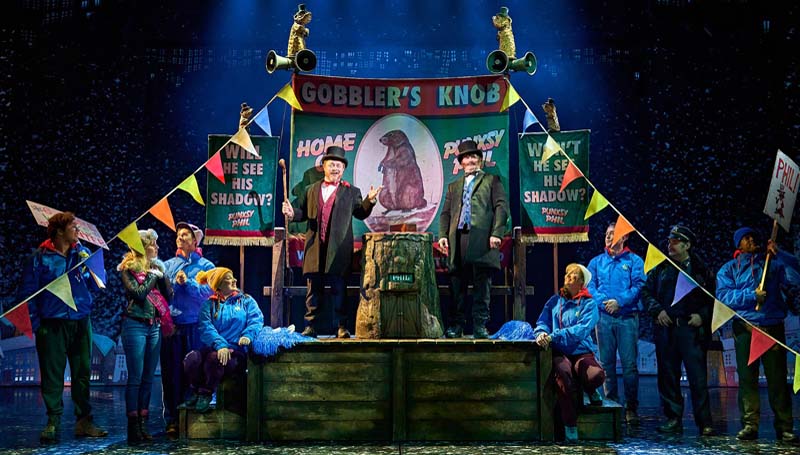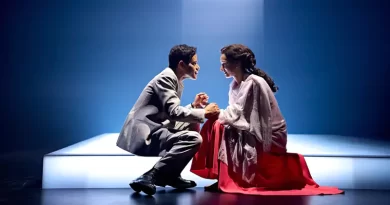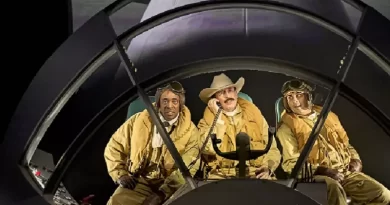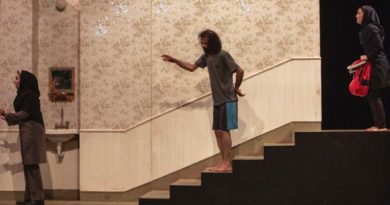“Groundhog Day” at the Old Vic
Mark Shenton on the South Bank
10 June 2023
If I ever found myself paralysed by time into re-living the same day again and again, I hope it would culminate in a performance of this musical version of Groundhog Day, based on the film of the same name, every single night. I would quite happily see it on endless repeat; I’m already up to 12 viewings, from its original Old Vic premiere run in 2017 (when I saw it three times), to its Broadway transfer in 2018 (seven times) and now its London return to the Old Vic (on its first preview and opening night, so far; I already have tickets booked for future performances too).
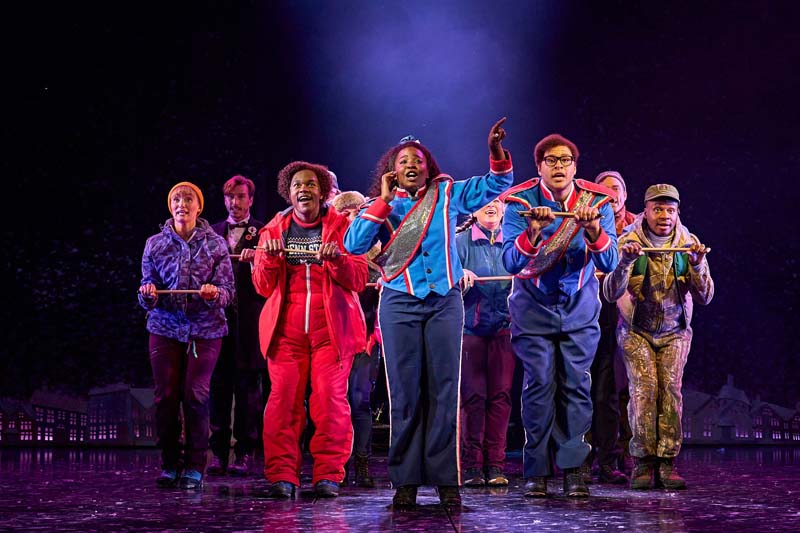
The company.
Photo credit: Manuel Harlan.
The 1993 film is about a Pittsburgh TV weatherman sent to cover the annual Groundhog Day event in the small town of Punxsutawney, Pennsylvania, where he gets caught up in a time loop. The co-author Danny Rubin has also written the book of the musical, newly amplified and embellished with songs by Tim Minchin. The story has of course given the English language a colloquial phrase for that feeling of déjà vu that engulfs one when it seems like you’re living the same day again and again.
For me, though, the story of the show – and its message – is a metaphor for the experience of living with depression, where every day is like the day before with seemingly no route out of the enveloping darkness apparent, until small shifts in one’s life creates a chink of light to come through, and eventually, lift it. It is also, for me, a musical about the experience of recovery. This musical shows how we can’t rewrite the past – but we can change our futures.
Change is possible – but you need to reach a rock bottom to do it. Watching Phil Connors, the surly, acerbic TV weatherman change his behaviour from obnoxious and predatory alpha male to a more caring, considerate man is to see a character embracing change, and switching from self-centred nihilism to hope in the process. He feels like a man in active recovery.
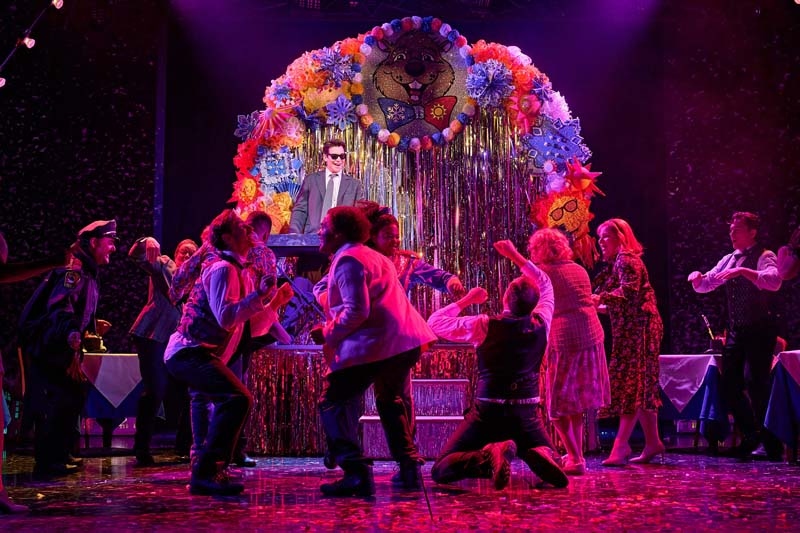
The company.
Photo credit: Manuel Harlan.
I may, of course, be seeing layers that aren’t actually there; but the genius of Minchin and Rubin’s multi-layered work, and of Matthew Warchus’s thrillingly textured and frequently magical production, is that it invites such speculation at all. It is daring, bold, and original at every turn – daring to indulge its own Groundhog Day by repeating the same scenes and musical motifs again and again, but boldly returning each time with adjustments that change the moment and meaning; and original in its simultaneous embracing of deep cynicism with real heart. It’s quite a balancing act.
There’s a truly hilarious Minchin song in the first act that could be plucked direct from the comedy cabaret man’s musical act in which he spoofs the multiple alternative treatments Connors tries to break out of his predicament of being stuck – “it’s like I feel I’m trapped in a loop, like I’m stuck in time”, he sings. One of the “therapists” offers: “Well think cutting out gluten is the smartest solution / better a diet of soup / made of rino foreskin.” As another admits, “This guy is clearly nuts but he is desperate and he’s paying / Statistically he might as well be sitting home and praying / For all the good that I can do, I don’t have a fricking clue what I’m doing / Though there are things that we just don’t know / It doesn’t mean you shouldn’t give giving an answer a go.” As Connors submits himself to their various strategies, he throws out one himself: “There are only 12 steps and they shouldn’t take long.”
The utter ingenuity of the show is to pattern his recovery journey with real theatrical bravado, culminating in a number about his own suicidal ideation called “Hope”, in which he repeatedly tries to commit suicide – “There will be mornings you will be utterly defeated by your laces”, it begins, before offering a painful exploration of his attempts to kill himself. But this being Groundhog Day, he can’t even achieve that successfully. I won’t spoil the surprises of Warchus’s staging, except to say that, with illusions by Paul Kieve, it delivers one after another. This may just be the single darkest number I’ve ever seen in a musical – it urges him to never give up hope, that he may yet succeed. “Never give up hope / Never let yourself be defeated / You tried it once, you tried it again / There’s always tomorrow.”
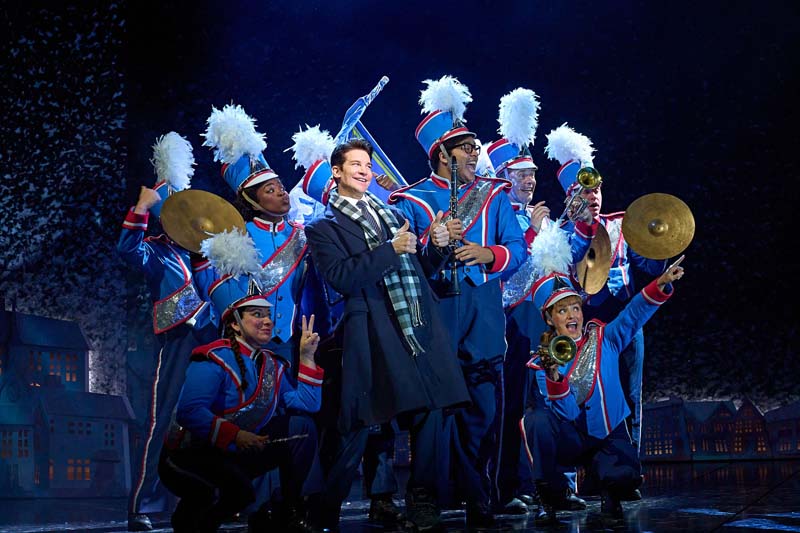
The company.
Photo credit: Manuel Harlan.
But the tomorrow that eventually dawns turns out to be a much happier one: despite his determined efforts to surrender to the enveloping despair – “On and on you grasp and guess / And search for patterns in the mess / Of what has been and what is left / To yet endure”, we hear in “Night Must Come” – Phil comes to realize in the closing number, “Seeing You”: “I thought the only way / To better days was through tomorrow / But I know now that I know / I know now that I know nothing / But I’m here / And I’m fine / And I’m seeing you, for the first time.”
I don’t mind admitting I shed real tears during this; I, too, have come to see myself for the first time in recovery. And watching this show for the 12th time, as I did on the opening night of its return to London, after suffering another lengthy depressive episode in between the last time it was here and now, it felt like I was seeing the show itself for the first time again.
Warchus’s production has had some big changes – Lizzi Gee has now replaced Peter Darling and Ellen Kane as choreographer, and Rob Howell’s sets have been streamlined so that they don’t involve multiple revolves (that were prone to technical problems first time around). But at its blazing centre remains the towering performance of Andy Karl as Phil Connors, full of rock-star charisma and playfulness, which already won him an Olivier Award in 2017.
He is joined by Tanisha Spring as Rita Hanson, his associate TV producer whom he repeatedly tries to hit on, with Andrew Langtree returning from the original cast as Ned Ryerson, the high school friend he repeatedly bullied, plus a vibrant ensemble animating the townsfolk with superb colour and wit.
“You gotta love life”, the musical urges; and you gotta love the show.
.
.
~

